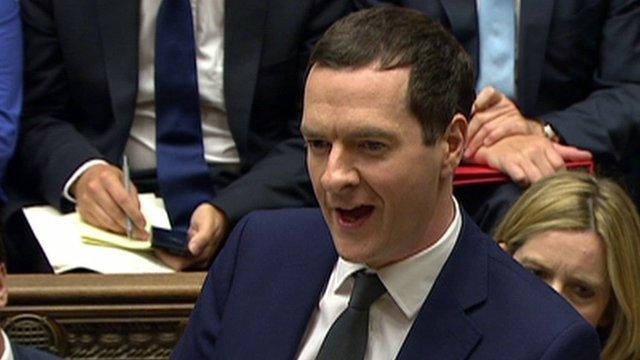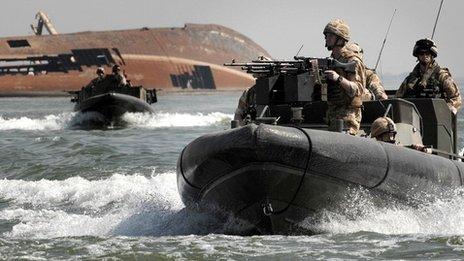Cameron 'losing patience' with Chilcot Iraq Inquiry delay
- Published
Angus Robertson asks the chancellor if reports are true that the Chilcot report has been delayed until 2016
David Cameron says he is "fast losing patience" with delays in the publication of the Iraq Inquiry report.
Sir John Chilcot, who chairs the inquiry, has written to the PM saying he cannot set a timetable for the release of the report.
Sir John says the inquiry is waiting for a number of witnesses to provide responses to a draft of criticism they may face in the final document.
The inquiry was set up in 2009 and was meant to report in 2011.
Follow all today's political developments on Politics Live
Replying to Sir John's letter, Mr Cameron says he is "disappointed" there is no timetable for the report to be completed.
"Since the establishment of the inquiry nearly six years ago, the British public, in particular those who served in Iraq or lost loved ones in the conflict have been awaiting the results of your work," he wrote.
"They, and I, had hoped for the publication of your report by now and we are fast losing patience."
'Democratic outrage'
Mr Cameron is limited in what he can do to speed up the publication of the report because the Chilcot inquiry, which has cost £10m so far, is independent - a fact acknowledged by Downing Street.
The SNP's leader at Westminster, Angus Robertson, raised the issue at Prime Minister's Questions, where Chancellor George Osborne was standing in for David Cameron.
"I asked the Chancellor if he felt a moral and political responsibility for getting to the bottom of this calamitous war and its consequences," said Mr Robertson in a statement.
"This inquiry needs to be published in full - and as a matter of urgency. Abandoning it would be wholly unacceptable.
"Answers are long overdue, and the continued delays to the publication of this report are a democratic outrage."
Mr Osborne told the SNP MP the Chilcot inquiry was "completely independent of government and we do not determine when it publishes its conclusions".
"But where I agree with the honourable gentleman is this: it has been a long time coming. And people, I think, are running out of patience. They want to see that report."
'Realistic timetable'
Sir John said his inquiry was in the "Maxwellisation phase", where witnesses are invited to respond to a draft of criticism they may face in the final report.
Sir John has written to the Prime Minister, David Cameron, saying the inquiry has received a "large proportion" of the responses it expected from witnesses.
"The responses have been constructive. In a number of cases they have opened up new issues or referred to material that was not part of the evidence submitted to the inquiry, which we are considering with care," he said.
He says it is "essential" that the remaining witnesses respond, so the inquiry can finish its work.
"Only when all responses are in our possession and have been evaluated will I be able to write to you with a realistic timetable for completion."
Conservative MP Jake Berry said Sir John should consider resigning from the inquiry if he cannot announce when he will publish a final report and consider making an interim report public.
The Rossendale and Darwen MP has written to Mr Cameron demanding that nobody who could be implicated in the inquiry should be given a public job or receive an honour until its publication.
He told the BBC: "This repeated delay potentially putting the report back to six years I think is completely unacceptable and he should... if he is unable to deliver consider his position."
- Published17 June 2015

- Published5 July 2016
